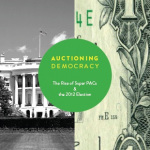Auctioning Democracy
The Rise of Super PACs & the 2012 Election
The presidential race had barely gotten off the ground when it became clear that 2012 would be the year of the Super PAC. The millions of dollars raised and spent by these strange and powerful court-created entities have created a kind of parallel campaign, this reports begins to investigates its effects on our democracy.
Downloads
MASSPIRG Education Fund and D?mos

D?mos and U.S. PIRG Education Fund analysis of Federal Election Commission data on Super PACs from their advent in 2010 through the end of 2011 reveals the following:
o For-profit businesses use Super PACs as an avenue to influence federal elections. 17% of the itemized funds raised by Super PACs came from for-profit businesses–more than $30 million.
o Because Super PACs–unlike traditional PACs–may accept funds from nonprofits that are not required to disclose their donors, they provide a vehicle for secret funding of electoral campaigns. 6.4% of the itemized funds raised by Super PACs cannot be traced back to an original source.
o Super PACs are tools used by wealthy individuals and institutions to dominate the political process. 93% of the itemized funds raised by Super PACs from individuals came in contributions of at least $10,000, from just twenty-three out of every 10 million people in the U.S. population.
Scholarly and public opinion research demonstrates that big-money dominance of campaigns skews American politics because wealthy donors have different life experiences and policy preferences than average-earning citizens. For example, a Russell Sage Foundation survey of high-earners conducted between February and June of 2011 revealed that:
o Wealthy respondents were nearly 2.5 times more likely than average Americans to list deficits as the most important problem facing our country.
o In spite of consistent majority public support for raising taxes on millionaires, among wealthy respondents, “[t]here was little sentiment for substantial tax increases on the wealthy or anyone else.”
o In spite of recent scandals on Wall Street, “more than two thirds of [survey] respondents said that the federal government ‘has gone too far in regulating business and the free enterprise system.”